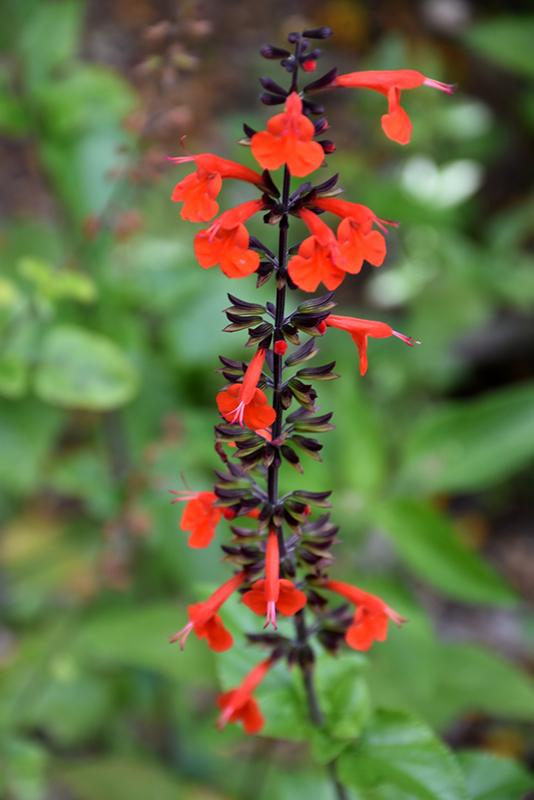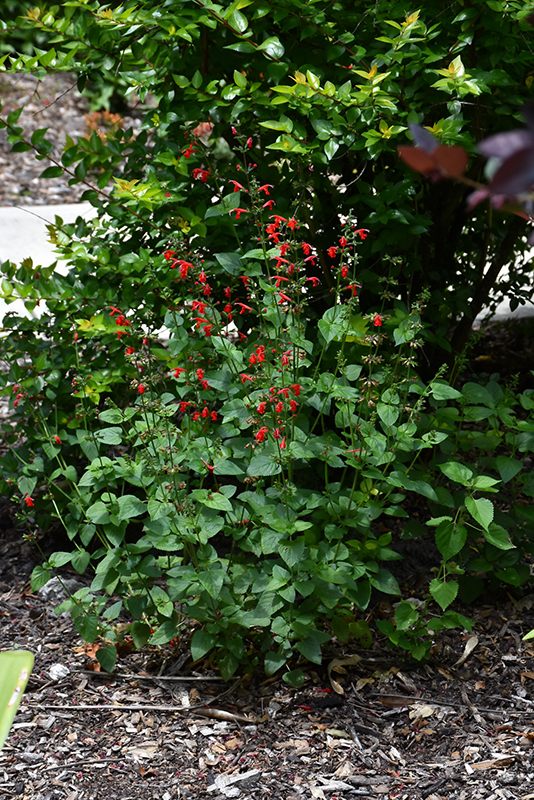Plant Height: 24 inches
Flower Height: 3 feet
Spacing: 15 inches
Sunlight:
![]()
Hardiness Zone: (annual)
Other Names: Blood Sage, Texas Sage, Tropical Sage
Description:
A brilliant variety producing multiple tall spikes of dazzling scarlet-red blooms on contrasting black stems; a beautiful addition to borders or containers with its dense and bushy form
Ornamental Features
Scarlet Sage has masses of beautiful spikes of scarlet tubular flowers rising above the foliage from early summer to mid fall, which are most effective when planted in groupings. The flowers are excellent for cutting. Its attractive fragrant heart-shaped leaves remain dark green in color throughout the season. The black stems are very colorful and add to the overall interest of the plant.
Landscape Attributes
Scarlet Sage is an herbaceous annual with an upright spreading habit of growth. Its relatively fine texture sets it apart from other garden plants with less refined foliage.
This is a relatively low maintenance plant. Trim off the flower heads after they fade and die to encourage more blooms late into the season. It is a good choice for attracting bees, butterflies and hummingbirds to your yard, but is not particularly attractive to deer who tend to leave it alone in favor of tastier treats. It has no significant negative characteristics.
Scarlet Sage is recommended for the following landscape applications;
- Mass Planting
- Border Edging
- General Garden Use
- Naturalizing And Woodland Gardens
- Container Planting
Planting & Growing
Scarlet Sage will grow to be about 24 inches tall at maturity extending to 3 feet tall with the flowers, with a spread of 18 inches. When grown in masses or used as a bedding plant, individual plants should be spaced approximately 15 inches apart. Although it's not a true annual, this plant can be expected to behave as an annual in our climate if left outdoors over the winter, usually needing replacement the following year. As such, gardeners should take into consideration that it will perform differently than it would in its native habitat.
This plant should only be grown in full sunlight. It is very adaptable to both dry and moist locations, and should do just fine under typical garden conditions. It may require supplemental watering during periods of drought or extended heat. To help this plant achive its best flowering performance, periodically apply a flower-boosting fertilizer from early spring through into the active growing season. It is not particular as to soil type or pH. It is somewhat tolerant of urban pollution. This species is native to parts of North America.
Scarlet Sage is a fine choice for the garden, but it is also a good selection for planting in outdoor pots and containers. With its upright habit of growth, it is best suited for use as a 'thriller' in the 'spiller-thriller-filler' container combination; plant it near the center of the pot, surrounded by smaller plants and those that spill over the edges. It is even sizeable enough that it can be grown alone in a suitable container. Note that when growing plants in outdoor containers and baskets, they may require more frequent waterings than they would in the yard or garden.


